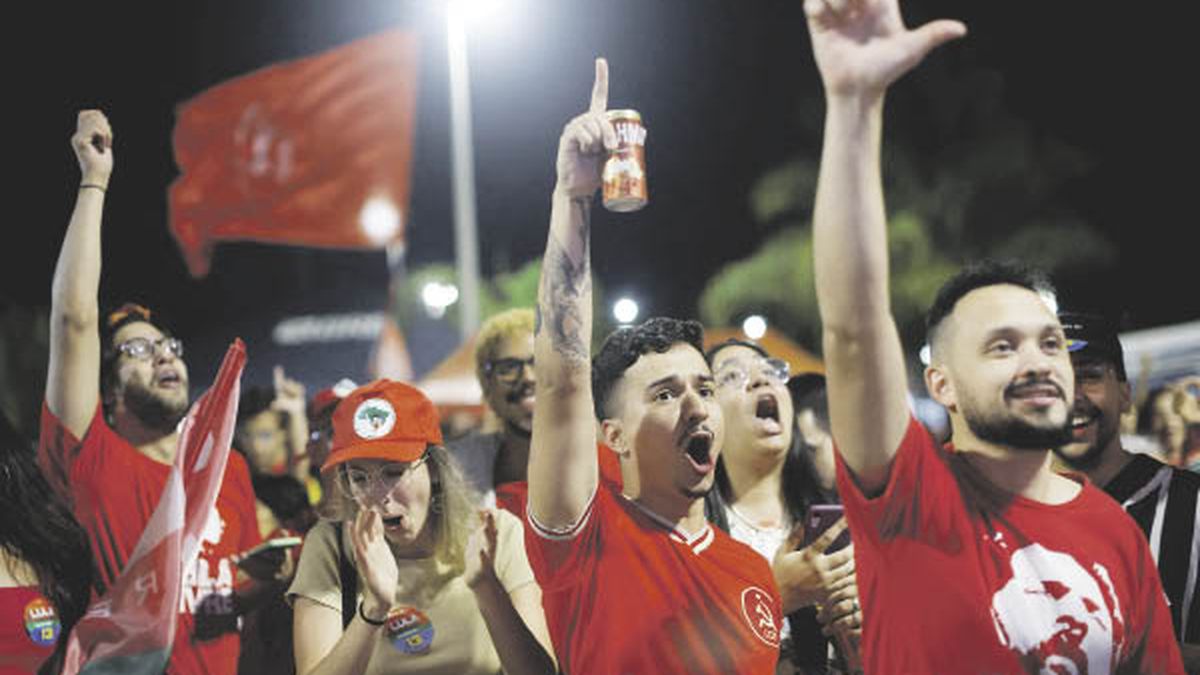The main pollsters had predicted a wide advantage for Lula for months and had even foreseen the possibility that the former president would win this Sunday without the need for a ballot on October 30. However, Bolsonaro resisted and achieved a result that only his supporters insisted on believing.
Meanwhile, Lula, who had even reserved the emblematic Paulista avenue to celebrate his victory in style in São Paulo, will now have to fight for every vote.
“The results will force Lula to court centrist and even conservative voters more aggressively in the next four weeks,” Oliver Stuenkel, a professor of international relations at the Getulio Vargas Foundation (FGV) in São Paulo, said in a tweet.
Bolsonaro, a 67-year-old former army captain, has focused his campaign strategy on moral values (“God, country, family”), a patriotic speech and attacks on his adversary, whom he refers to as the “thief” and “ex-convict”.
He maintains solid support among evangelicals, who represent a third of the electorate, agribusiness and popular sectors that do not forgive Lula’s Workers’ Party for its corruption scandals.
The far-right had attacked the polls at his rallies: he assured that the electoral temperature had to be taken in the streets, and that in that case he would win by far. Two weeks ago he said it would be “abnormal” not to win by 60% in the first round.
His mandate was marked by a turbulent management of the pandemic that left 686,000 dead, an increase in poverty and hunger, record levels of deforestation in the Amazon, and attacks against judicial institutions and the press.
For his part, Lula, 76, was counting on reaching a third presidency in the first round, supported by the popular classes, women and young people, after having governed Brazil between 2003-2010 and having left power with an enviable rate of popularity.
But Lula has not been able to shake off the stain of corruption in the eyes of a good part of society. He was sentenced and later had his convictions annulled on procedural grounds for the Lava Jato scandal over a bribery ring at state oil company Petrobras.
In downtown Rio, Viviane Laureano da Silva, a 36-year-old civil servant, was confident that Lula “will win in a second shift. The campaign is going to be difficult. I am from the periphery and I see how the people support Lula”, she said after knowing the results.
“The extreme right is very strong throughout Brazil,” said Carlos Melo, a political scientist at the Insper business school. “Lula’s victory in the second round is now less likely. Bolsonaro will come to re-election with great force.”
Outside the Bolsonaro family home in the Barra da Tijuca neighborhood of Rio de Janeiro, the scene of jubilant celebrations when Bolsonaro was elected in 2018, the mood was increasingly optimistic.
Maria Lourdes de Noronha, 63, said only fraud could prevent a Bolsonaro victory, adding that “we will not accept him” if he loses. “The polls in our country, the media and the journalists, are liars, scoundrels,” she said.
Whoever is the winner, will assume the Presidency on January 1, 2023 and with it, the reins of the largest and most populous country in South America, as well as its largest economy, the tenth in the world, according to the IMF based on nominal GDP . Poverty nearly doubled in Brazil under Bolsonaro, largely, as in many countries in the region, as a result of the coronavirus pandemic.
During Lula’s terms, from 2003 to 2010, millions of people joined the middle class thanks to the praised social programs of the former president, who came to the Presidency after being born into poverty, in the northeast of Brazil.
Brazil has started to grow again since last year, when its economy rebounded more than 4.5% in 2021, the biggest rise in a decade, after a 3.9% decline in 2020, the first year of the coronavirus, the biggest crash in 24 years. This year, the Brazilian economy accumulates a growth of 2.5%, thanks to an advance in all its sectors: industry, services and agricultural activity, according to official figures.
However, inflation has shot up to 8.8% as a result of the war in Ukraine, a very high figure for a country accustomed to between 3 and 4% a year, and which has pushed millions more into poverty.
Lula is favored among the poorest electorate and among minorities, including women, while Bolsonaro’s strongest electoral base is made up of whites and the evangelical sectors, very important in Brazil.
Source: Ambito
David William is a talented author who has made a name for himself in the world of writing. He is a professional author who writes on a wide range of topics, from general interest to opinion news. David is currently working as a writer at 24 hours worlds where he brings his unique perspective and in-depth research to his articles, making them both informative and engaging.




